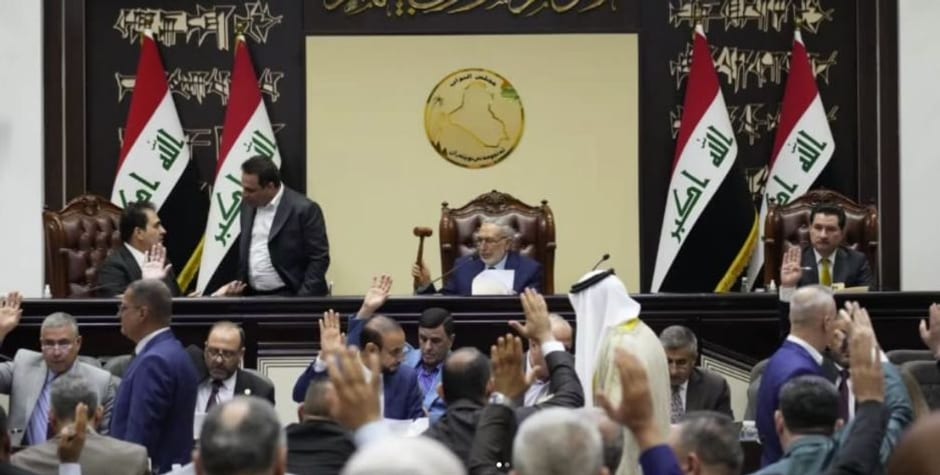As Iraq approaches its parliamentary elections in November 2025, around thirty Christian candidates are competing for the five seats reserved for their community in the federal parliament. Yet this democratic showcase can no longer conceal the shrinking of Iraq’s Christian community to a mere shadow of its former self. Heirs to two millennia of presence in Mesopotamia, Christians today face triple marginalization: the dispossession of their lands and a true cultural genocide, the fragility of their institutional and political representation, as well as social and economic pressures that jeopardize their survival in the country.
Iraq has faded from the headlines, and many believe it is rebuilding itself thanks to its oil. “But that is false: religious minority communities, particularly Christians and Yazidis, are still in urgent need of help,” warns Pascale Warda, cofounder of the NGO Hammurabi (HHRO) and former Minister of Migration and Refugees (2004–2005). The Iraqi authorities have yet to understand that recognizing minority rights is a strategic asset: marginalizing them weakens national unity, while their integration would strengthen Iraq at every level.
Dispossession of Christian Lands and Cultural Genocide
Present in Mesopotamia for two millennia but driven out by the Islamic State in 2014, Iraq’s Christians now see their lands and properties confiscated or usurped without real protection from the federal state. In its latest annual report, published in September 2025, Hammurabi documents thousands of cases of land grabs in the Nineveh Plain, Baghdad, and Kurdistan. Legal proceedings, when they exist, remain slow, rarely enforced, and often obstructed by influential actors—political or administrative officials, powerful Kurdish families, and local notables, sometimes supported by militias—who exploit their positions to perpetuate these expropriations to the detriment of Christian communities.
This phenomenon is compounded by practices of property title forgery, particularly in the Nahla district, confirms the European Centre for Law and Justice (ECLJ) in its May 2025 submission to the UN Special Rapporteur on Minorities. While the Special Rapporteur was scheduled to visit Iraq in June 2025, his trip was canceled due to Israeli strikes in Iran. Some churches destroyed by Islamic State jihadists have never been rebuilt, while others have been converted into mosques. This amounts to a “cultural genocide” that gradually erases the Christian presence, according to Chaldean Archbishop of Mosul, Monsignor Najeeb.
Institutional and Political Fragility
The political representation of Christians officially relies on a quota system. Iraq’s 2020 electoral law reserves five out of 329 seats in the federal parliament for Christians. In practice, however, these seats are often captured by the major Shiite, Sunni, or Kurdish parties, which impose their own candidates on minority lists, turning this mechanism into a showcase with no real protective effect. The situation worsened in Kurdistan: in February 2024, the Federal Court annulled 11 quota seats out of the 111 in the regional parliament, including five reserved for Christians (Chaldeans-Assyrians-Syriacs) and one for Armenians. This suppression provoked outrage among minorities, who announced a boycott of the June 2024 elections, before the Court partially reversed its decision in May 2024, restoring only five quota seats.
The crisis sparked in July 2023 by the withdrawal of the presidential decree recognizing the official status of Cardinal Louis Raphaël Sako, Patriarch of the Chaldean Church, and guaranteeing the legal protection of church properties, vividly illustrates the institutional precariousness of Christian communities in Iraq. Forced to leave Baghdad for Erbil, the Patriarch denounced an atmosphere of pressure and violations against the Church. The affair caused an international shockwave, prompting interventions from Ayatollah Ali al-Sistani, the United States, and Prime Minister Mohammed Shia al-Sudani, before Cardinal Sako was able to regain his status and return to Baghdad in June 2024.
Social and Economic Pressures
The Personal Status Law, adopted in 1959, had established a progressive civil framework for family matters. But in January 2025, parliament adopted amendments allowing Shiite Muslims to have their family affairs adjudicated outside the unified civil code, according to Ja‘fari jurisprudence—an oppressive form of Islamic law already enforced in Iran. The consequences of this reform are particularly troubling: the risk of early marriages, from as young as 9 years old for girls; increased inequalities for women; and the weakening of minorities, whose family rights are now subject to majority religious norms. For Christians, already facing forced conversions of children and discrimination in inheritance matters, this development further deepens their legal and social vulnerability.
Christians also face attacks on their livelihoods. The arbitrary closure of businesses linked to the sale of alcohol—an activity historically associated with their communities—has plunged many families into poverty. More broadly, the ECLJ notes that Christians are relegated to precarious jobs, rarely integrated into the public sector, and discriminated against in access to education and services. For example, Islamic teaching permeates the entire school curriculum, where Christians are labeled as “infidels” and “dhimmis,” shaping negative perceptions from an early age.
The Exodus of Iraq’s Christians Is Not Inevitable
This triple marginalization of Christians fuels their exodus: their population has dropped from 1.5 million in 2003 to about 140,000 today. In response, the ECLJ advocates for Christian communities before European and international institutions. We also call for support to local NGOs, which are essential for their survival and future: human rights organizations such as Hammurabi, but also return initiatives like The Return, founded in 2023 by Dilan Adamat. Having grown up in France, this Franco-Iraqi chose to return to Ankawa, a Christian suburb of Erbil, and has since worked to help displaced families reclaim their lands, their homes, and their dignity.














